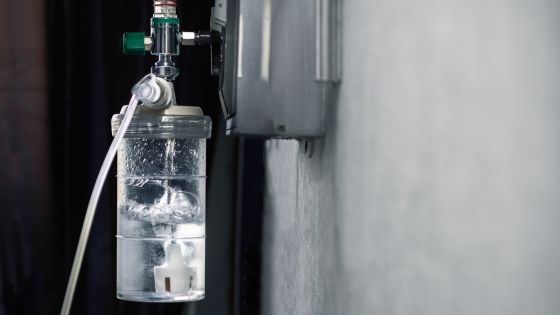The entire healthcare scene has seen a surge in demand for various medical equipment due to the COVID-19 epidemic, with oxygen concentrators taking center stage. Oxygen concentrators are crucial equipment that provides a steady oxygen supply to persons with respiratory issues. The oxygen concentrator with humidifier is becoming increasingly popular as a way to improve comfort and respiratory health. Information regarding the comfortable breathing of people like Oxygen bottle sizes and everything else of this sort is getting of utmost significance for people for this reason. They focus on every minute information related to their comfort breath. Oxygen concentrator with humidifier is also an important part of this information that plays crucial role in providing comfortable breath to humans. However, the question remains: Is an oxygen concentrator with a humidifier necessary? Let’s examine the benefits, considerations, and situations when this combination might be effective.
Understanding Oxygen Concentrators And Humidifiers
An oxygen concentrator furnishes continuous oxygen to individuals experiencing chronic obstructive pulmonary disease (COPD), asthma, or respiratory distress, serving as vital medical apparatus. It extracts oxygen from the surrounding air, concentrates it, and then delivers it to the user via a nasal cannula or mask.
On the contrary, a humidifier operates as a device that introduces moisture into the atmosphere, diminishing dryness and alleviating irritation within the respiratory system. It is frequently recommended for people living in arid climates, utilizing heating systems that dry up the air, or patients requiring supplemental oxygen therapy.
The Merger: Oxygen Concentrator And Humidifier
The idea behind combining an oxygen concentrator and a humidifier is to alleviate some of the discomfort associated with oxygen therapy. Because of the drying impact of the concentrated oxygen, oxygen treatment, mainly when used for long periods, can cause dry nasal passages, sore throat, and nasal congestion. A humidifier connected to an oxygen concentrator provides moisture to the given oxygen, relieving these symptoms.
Benefits Of An Oxygen Concentrator With Humidifier
An oxygen concentrator with a built-in humidifier provides several advantages that can considerably improve the quality of life for people who require oxygen therapy. Let’s take a closer look at these benefits:
Improved Comfort and Hydration
Because of the drying impact of concentrated oxygen, oxygen therapy frequently results in dry nasal passages, throat, and skin. The humidifier component adds moisture to the oxygen stream, minimizing discomfort and maintaining healthy respiratory hydration levels. As a result, the user has a more comfortable and calming experience.
Respiratory Health Enhancement
Maintaining appropriate moisture in the airways is critical for people with respiratory disorders like COPD, asthma, or bronchitis. Dry air can worsen symptoms and impair lung function. A humidifier-equipped oxygen concentrator keeps the airways wet, which improves respiratory health and may reduce the frequency and severity of exacerbations.
Mucous Clearance Facilitation
Respiratory diseases typically cause excess mucus and phlegm production. Dry air can make clearing these secretions from the airways harder, resulting in congestion and breathing difficulties. The humidifier’s additional moisture can help break down mucus, making removing it simpler and boosting overall lung function.
Prevention of Irritation
Oxygen therapy can induce nasal passage irritation, resulting in symptoms such as nosebleeds, dryness, and pain. The humidifier solves these concerns by maintaining an ideal humidity level, reducing the likelihood of discomfort and other adverse effects.
Enhanced Sleep Quality
Dry air can cause discomfort while sleeping, disrupting sleep patterns. Individuals are less prone to encounter symptoms such as dry mouth and throat by humidifying the given oxygen, contributing to increased sleep quality and overall restfulness.
Reduced Risk of Infections
Adequately humidified air plays a crucial role in preserving the structural integrity of the respiratory system’s mucous membranes, functioning as a protective shield against infections. Dry air can foster bacterial development, increasing the likelihood of respiratory illnesses. The humidifier contributes to a less favorable environment for germs.
Considerations Before Opting For An Oxygen Concentrator With Humidifier
Before purchasing an oxygen concentrator with a built-in humidifier, consider many criteria to verify that this combination matches your needs and circumstances. Here are some crucial things to remember:
Medical Necessity
The primary consideration should be the individual’s medical condition who will be utilizing the item. While a humidifier might bring additional comfort, it is not always necessary. Individuals suffering from COPD, chronic bronchitis, or pulmonary fibrosis may benefit more from humidification since their airways are more susceptible to dryness and irritation. It is critical to consult a healthcare expert to decide whether a humidifier-equipped oxygen concentrator is medically necessary.
Consultation with Healthcare Provider
Contacting a trained healthcare practitioner before making any decisions about medical equipment, especially oxygen concentrators with humidifiers, is critical. A doctor or respiratory therapist can evaluate the patient’s medical history, current condition, and oxygen therapy needs to determine whether a humidifier is required. Their knowledge guarantees that the treatment plan meets the demands of the patient.
Climate and Environment
Please consider the environment and climate in which you will operate the oxygen concentrator. Dry conditions can worsen the drying impact of oxygen therapy. In such instances, a humidifier can be especially useful in combating the dryness in the air. In contrast, the requirement for a humidifier may be less evident in highly humid conditions. Adapting equipment to local needs can substantially impact the user’s comfort.
Budget and Insurance Coverage
Oxygen concentrators with built-in humidifiers cost more than basic versions without this capability. It is critical to evaluate your budget and investigate potential insurance coverage choices. Specific insurance policies may pay the cost of an oxygen concentrator if it is judged medically necessary. Making an informed decision requires weighing the rewards and costs.
Maintenance Requirements
Humidifiers, by definition, introduce moisture into the air, which can foster the growth of bacteria, mold, and other microbes. Regular upkeep, which involves the maintenance and disinfection of the humidifier, is necessary to ensure a safe and hygienic supply of oxygen. Consider whether you’re ready to take on the responsibility of caring for the humidifier and ensuring the proper functioning of the entire device.
Ease of Use
Due to the additional component, certain oxygen concentrators with built-in humidifiers might have more intricate controls or settings. It’s worth considering how easy the device is to use, especially if the user is an elderly person or someone who might struggle with complex equipment. Having controls that are easy to understand and clear instructions is crucial for a smooth experience.
Conclusion
In medical equipment, merging a humidifier with an oxygen concentrator offers a promising way to alleviate the discomfort often accompanying oxygen therapy. Introducing moisture to the oxygen delivered can significantly improve the comfort, respiratory health, and overall well-being of individuals with respiratory problems.
However, the decision to opt for an oxygen concentrator with a humidifier should be based on individual medical requirements, consultations with healthcare experts, and factors like the local climate and budget. Ultimately, the objective is to ensure the highest possible quality of life for patients dependent on oxygen therapy.




















